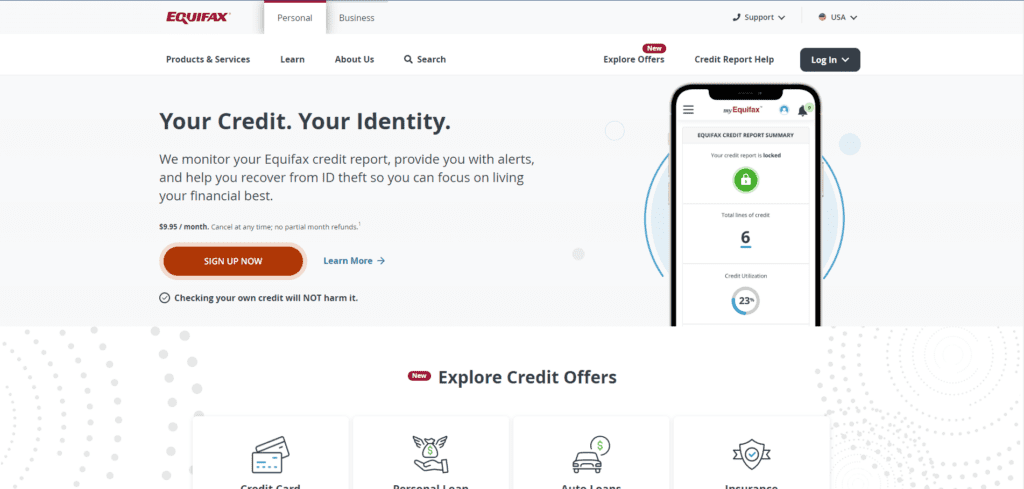So you’re looking to check your credit report and score. Smart move! But with three big credit bureaus out there (and all the rest) – Equifax, Experian, and TransUnion – how do you know which one has the most up-to-date and reliable information about your credit history?
The truth is each bureau may show some differences in your credit details. It all depends on which lenders report your credit activity to each company. But not to worry! While no bureau is perfect, all three provide quite comprehensive reports.
The key is being able to access your reports and monitor all three periodically.
This gives you the full picture so you can catch any errors early and understand how lenders view your financial reputation. Read on, and we’ll break down what you need to know about each bureau and how to get your hands on those essential credit reports.
Let’s get into it.
An Introduction to Credit Report Providers
When it comes to credit reports, three major players are providing all that data about your financial behavior – Equifax, Experian, and TransUnion. These companies have been around for ages, gathering info from lenders and public records to create your reports.
Equifax is the industry’s veterans, founded way back in 1899. Today, over 500 million customers worldwide use credit reports powered by their data. Meanwhile, Experian has its roots across the pond in London. But it has grown into a global force, with over a billion people counted as its customers!
Finally, TransUnion focuses on analytics to serve both businesses and consumers.
Now, let’s talk about what shapes your all-important credit score.
The main ingredients are your payment history, how much of your available credit you’re using, the length of your credit history, the kinds of credit you have (e.g., loans, credit cards, etc.), and any new applications for credit or “hard inquiries.”
Here’s the catch, though – since each bureau collects data independently, what they have on you could vary somewhat. Differences can pop up due to things like reporting timelines or errors. That’s why checking all your reports is so valuable – you get the complete picture, so there are no surprises!
Comparing the Major Credit Bureaus
When it comes to your credit report, Equifax, Experian, and TransUnion make up the big three bureaus that lenders rely on. Each bureau offers its own unique mix of credit monitoring tools, reports, and special features. Getting familiar with these key players is vital so you can access your most complete financial profile.
Equifax: The Long-Running Monitoring Specialists

With over 120 years in business, Equifax knows a thing or two about credit reporting! Alongside the standard reports on your payment history and scores, Equifax lets you sign up for ongoing credit monitoring. This keeps you on top of any suspicious activity.
Unique Features: Locking and unlocking your credit report, sending alerts on key changes, identity protection
Pros: User-friendly interface, detailed reports explaining your score and how to boost it, enhanced fraud monitoring services.
Cons: Some complaints about customer service, high-profile security breaches in recent years
Experian: Prioritizing Credit Integrity
Experian distinguishes itself by zeroing in on comprehensive, integrity-focused credit data and support.
Unique Features: Experian Boost lets you add positive payment history from bills like utilities and cell phones to potentially improve your scores!
Pros: In-depth reports highlight factors influencing your scores, fraud protection services, abilities to lock/unlock access to your report
Cons: You need a paid monthly membership for full access to credit monitoring features
TransUnion: Analytics and Alerts
TransUnion uses advanced analytics to equip businesses and consumers with actionable credit insights.
Unique Features: Get alerts on any meaningful changes or suspicious activity found in your credit file.
Pros: Helpful direction on improving your score, detailed reports with interpretations of your credit health, praised customer assistance.
Cons: Their credit scoring models differ from other bureaus, leading to inconsistencies with some lender scores.
What Accounts for Differences in Reports?
With each bureau gathering their own data, variations in your reports can happen due to:
- Lenders reporting your activity to some bureaus but not others
- Timeline differences in when lenders update each bureau
- Unique scoring models used by each company
The takeaway? Don’t assume one bureau alone gives the complete financial picture used by lenders. Checking all three lets you monitor every angle – the wise route to credit health!
Expert Insights on Choosing a Reliable Credit Report

So we’ve got the lowdown on Equifax, Experian, and TransUnion. But what do financial professionals say about getting trustworthy credit reports from these three?
The Reliability Rundown
While each bureau has strengths and weaknesses, all three meet credibility and certification standards to deliver reliable reports.
The common advice? Review your reports from all of them regularly to get the full picture and quickly address any discrepancies.
To Use One Bureau or Three? The Trade-Offs
- Single Bureau Pros: Cheaper, simpler to dispute errors
- Single Bureau Cons: Incomplete view, higher risk of missing issues
- Multiple Bureaus Pros: Comprehensive credit health check, catch discrepancies
- Numerous Bureaus Cons: More expensive, more time monitoring all reports
Tips for Choosing Your Credit Report Provider
Consider what aligns with your financial aims, how detailed and precise their reports are, extra identity protection tools available, costs, and customer service.
While no bureau is perfect, experts emphasize checking Equifax, Experian, AND TransUnion reports. This gives the most complete overview to guide smart money decisions!
Action Points and Tips for Credit Report Management
Here are some actionable steps and expert tips for managing your credit reports:
- Check In Regularly: Review reports from all three bureaus a few times a year. This helps you catch any concerns early!
- Dispute Errors ASAP: If you find mistakes when reviewing your reports, formally dispute them immediately to maximize your scores.
- Check Before Major Decisions: Thinking of getting a mortgage or car loan? Be sure to examine your latest credit reports first, so you know where you stand.
- Use Helper Tools: Services like Cambio provide convenient credit monitoring and give tips to build your scores. Leverage technology to simplify credit management!
The key is staying engaged with your credit profile rather than just peeking at it once in a blue moon. Following these simple tips will help you make the most of your reports and maintain financial confidence!
Conclusion
Accurate credit reports are critical when saving money on loans or even landing a new job. While there’s no one-size-fits-all strategy, regularly checking your reports from all three major bureaus gives the most complete picture.
Building responsible financial habits over time is so important for your future. Services like Cambio use cutting-edge technology to simplify monitoring your credit and provide guidance to improve it.
Don’t let poor credit hold you back. Supercharge your credit, resolve debt, and protect your identity with Cambio’s AI-powered solutions. Ready for a healthier financial life?
Get started with Cambio today.



